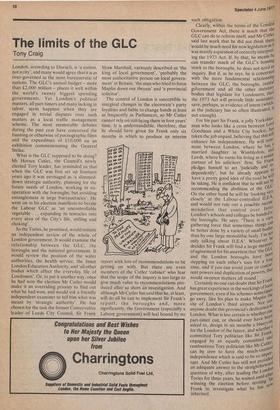The limits of the GLC
Tony Craig
London, according to Disraeli, is 'a nation, not a city', and many would agree that it is as over-governed as the most bureaucratic of nations. The GLC's annual budget — more than £2,000 million — places it well within the world's twenty biggest spending governments. Yet London's political masters, all part-timers and many lacking in talent, seem happiest when they are engaged in trivial disputes over such matters as a local traffic management scheme. The most memorable debates during the past year have concerned the banning or otherwise of pornographic films and the expenditure of £10,000 on an exhibition commemorating the General Strike.
What is the GLC supposed to be doing? Mr Horace Cutler, the Council's newly elected Tory leader, has reminded us that when the GLC was first set up fourteen years ago it was envisaged as -'a slimmeddown strategic authority, planning for the future needs of London, working in cooperation with the boroughs, but avoiding entanglement in large bureaucracies'. He went on in his election manifesto to berate the Labour GLC as 'an uncontrollable vegetable .. . expanding its tentacles into every area of the City's life, stifling and choking'.
So the Tories, he promised, would initiate an independent review of the whole of London government. It would examine the relationship between the GLC, the boroughs and the national government. It would review the position of the water authorities, the health service, the Inner London Education Authority, and 'all other bodies which affect the everyday life of Londoners'. Or, to put it another way, once he had won the election Mr Cutler would make it an overriding priority to find out what he had won, and would ask a friendly independent examiner to tell him what was meant by 'strategic authority'. He has chosen for the task the former Conservative leader of Leeds City Council, Sir Frank Shaw Marshall, variously described as `the king of local government', 'probably the most authoritative person on local government' in Britain, 'the man who tried to force Maplin down our throats' and `a provincial solicitor'.
The control of London is susceptible to marginal changes in the electorate's party loyalties and liable to change hands at least as frequently as Parliament, so Mr Cutler cannot rely on still being there in four years' time. It is understandable, therefore, that he should have given Sir Frank only six months in which to produce an interim report with lots of recommendations to be getting on with. But there are even members of the Cutler 'cabinet' who fear that the scope of the inquiry is too large to give much value to recommendations produced after so short an investigation. And although Mr Cutler has said that he, at least, will do all he can to implement Sir Frank's report, the boroughs and, more significantly, the Government (especially a Labour government) will feel bound by no such obligation.
Clearly, within the terms of the London Government Act, there is much that the GLC can do to reform itself, and Mr Cutler said last week that he did not think there would be much need for new legislation as was mainly a question of correctly interPret' ing the 1973 Act, If, by that, he means he can transfer much of the GLC's housing stock to the boroughs, he does not need an inquiry. But if, as he says, he is concerned with the more fundamental relation between the GLC, the boroughs, central gosvernment and all the other statutorY bodies that legislate for Londoners, then the 1,973 Act will provide little assistance, save, perhaps, as evidence of intent (which,' as the judiciary has sO often illustrated, IS not enough). For his part Sir Frank, a jolly Yorkshire; man who looks like a cross between Low Goodman and a White City bookie, hail taken the job unpaid, believing that this enhance his independence. He will CO. mute between London, where he [Iasi ad married daughter in Wimbledon, 8,11, Leeds, where he earns his living as a sern°/: partner of his solicitors' firm. Sir Fra,11: pledges himself to act `judicially and dependently', but he already apPears :11 have a pretty good idea of the road he svi' be taking. He is confident that he will notc. recommending the abolition of the a On the other hand he will be 'looking closely' at the Labour-controlled II-Ern. and would not rule out a possible recorn" mendation that control over 1011,e1 London's schools and colleges be handen' the boroughs. He says: 'There is a vie!, gathering force that sometimes things ca" be better done by a variety of small bodiel than by one large monolithic body. I'm 11° only talking about ILEA'. Whatever he decides Sir Frank will find a large Ineas.rce of agreement for his assertion that 'the , and the London boroughs have been stepping on each other's toes for a 1°f time, and if you can avoid joint or concur; rent powers and duplication of powers, tha would sweeten matters all round.' Certainly no one can doubt that Sir Frarill has great experience in the workings of loceas government, even if his schemes somerialhe go awry, like his plan to make Maplin t„0 site of London's third airport. No c°•,, anyone doubt this proyincial's dedication_we London. What is less certain is whether °11e11 part-timer can, or should ever have be asked to, design in six months a blue013 for the London of the future, and whetherk. committed Tory politician like Sir Frari„d engaged by an equally committed a_ur, rumbustious Tory politician like Mr Cutit'ed can be seen to have the much-va°not. independence which is said to be so inirded tant. And Mr Cutler has still not provl ard an adequate answer to the straightforw,..0 question of why, after leading the Lontr
, Tories for three years, he waited until Of.
sit winning the election before inviting ow Frank to investigate what he has I/ inherited.


































 Previous page
Previous page